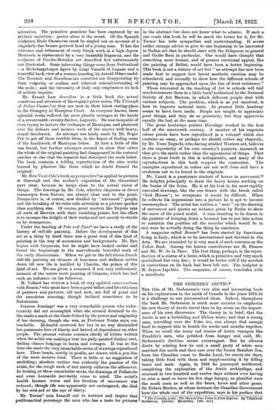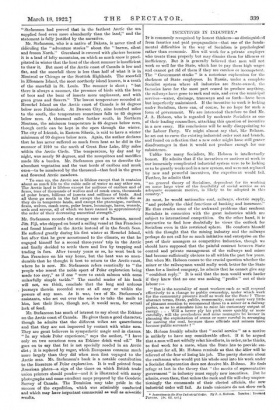THE FRIENDLY ARCTIC.*
TIIE title of Mr. Stefansson's very able and interesting book on his explorations to the north of Canada in the years 1913-18 is a challenge to our preconceived ideas. Indeed, throughout the book Mr. Stefansson is much more anxious to emphasize his new theory of Arctic travel than to lay stress on the import- ance of his own discoveries. The theory is, in brief, that the, Arctic is not a forbidding and lifeless waste, and that a strong man, travelling over the Polar ice, can always find enough food to support him in health for weeks and months together. When we recall the many sad stories of Arctic voyagers like Franklin's men, who perished from hunger and cold, Mr. Stefansson's doctrine seems extravagant. But he silences doubt by relating how he and a small party of white men marched due north and then east over the frozen Beaufort Sea, from the Canadian coast to Banks Land, for ninety-six days-, taking little food with them and supplementing it by killing bean and- seals. Again, in 1916 he journeyed northward, completing the exploration erf the Arctic: archipelago, and returned in two hundred and twelve days without ever having to miss a meal or leave his few dogs hungry, so plentiful were the musk oxen as well as the bears, hares and other game. Sir Robert Barden, at whose instance the Canadian Government bore the whole cost of the expedition, says in his preface that • The Friendly A,-die : The Story of Five Years in Polar Regions. By Slikabnar atefnmeon. London: Macmillan. [30a. net-I
"Stefansson had proved that in the farthesti Arctic the sea supplied food even more abundantly than the land," and the statement is fully justified by the narrative.
Mr. Stefanason, who is a native of Dakota, is never tired of ridiculing the "adventure stories" about the "barren, silent and frozen North." Greenland is covered with glaciers because it is a land of lofty mountains, on which so much snow is preci- pitated in winter that the heat of the short summer is insufficient to thaw it. But most of the Arctic coast of Canada is low and flat, and the snowfall there is less than half of what it is in Montreal or Chicago or the Scottish Highlands. The snowfall in Ellesmere Island, the most northerly island known, is a tenth of the snowfall in St. Louis. Tho summer is short ; "but there is always a summer, the presence of birds with the hum of bees and the buzz of insects more unpleasant, and with green grass and flowers." The lowest temperature recorded at Herschel Island on the Arctic coast of Canada is 54 degrees below zero Fahrenheit. At Dawson City, nine hundred miles to the south, the temperature sometimes falls to 65 degrees below zero. A thousand miles further south, in Northern Montana, the minimum temperature is 68 degrees below zero, though cattle can be kept in the open through the winter.
The city of Irkutsk, in Eastern Siberia, is said to have a winter minimum of 90 degrees below zero. Again, the author declares that he has never suffered so much from heat as he did in the summer of 1910 to the north of Great Bear Lake, fifty miles within the Arctic Circle. The temperature, by day and by night, was nearly 90 degrees, and the mosquitoes and sandflies made life a burden. Mr. Stefansson goes on to describe the abundant vegetation and the vast herds of caribou and musk oxen—to be numbered by the thousand—that feed in the green and flowered Arctic meadows.
"To sum up, the Arctic sea is lifeless except that it contains about as much life to the cubic mile of water as any other sea. The Arctic land is lifeless except for millions of caribou and of foxes, tens of thousands of wolves and of musk oxen, thousands of polar bears, billions of insects and millions of birds. And all these go south in the fall except the insects which die as they do in temperate lands, and except the ptarmigan, caribou, foxes, wolves, musk oxen, polar bears, lemmings, hares, weasels, owls and ravens, all of which we have named in approximately the order of their decreasing numerical strength."
Mr. Stefanason records the strange case of a Samoan, named Jita Fiji, who shipped on board a sailing vessel at San Francisco and found himself in the Arctic instead of in the South Seas. He suffered greatly during his first winter at Herschel Island, but after that he grew accustomed to the climate, so that he engaged himself for a second three-years' trip in the Arctic and finally decided to settle there and live by trapping and trading in furs. After twenty years or so, he went back to San Francisco on his way home, but the heat was so unen- durable that he thought it best to return to the Arctic coast, where he is now. Mr. Stefansson refers caustically to "the people who resent the noble sport of Polar exploration being made too easy," as if one "were to catch salmon with some unlawfully simple tackle." The careful reader of his book will not, we think, conclude that the long and arduous journeys therein recorded were at all easy or within the powers of any man. As it was, two of Mr. Stefansson's assistants, who set out over the sea-ice to take the mails to him, lost their lives, though not, it would seem, for actual lack of food.
Mr. Stefansson has much of interest to say about the Eskimo on the Arctic coast of Canada. He gives them a good character, though he admits that the different tribes are quarrelsome and that they are not improved by contact with white men. They are great believers in sympathetic magic and in charms. "In my whole Polar experience," says the author, "I have only on two occasions seen an Eskimo drink -seal oil." He goes on to say that fat is not specially needed in an Arctic diet ; it is replaced by sugar, which Europeans consume much more largely than they did when men first voyaged to the ' Arctic seas. Mr. Stefansson's book is a notable contribution to the literature of Polar exploration. It is well printed from American plates—a sign of the times on which British trade union printers should ponder—and it is illustrated with, many photographs and some excellent maps prepared by the Geodetic Survey of Canada. The Dominion may take pride in the
success of the expedition, which was admirably conducted and which may have important commercial as well as scientific results. Parions. L4s. 6d. net.)



































 Previous page
Previous page